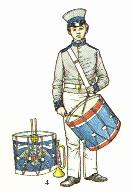
Campfire Songs
When a soldier wasn't in the heat of battle, the worst non-lethal enemy was boredom. Whether on the march, in camp, or on picket duty, music was always present. Fife and drum corps were used to keep soldier's minds off their sore feet while marching, and regimental bands gave concerts at night to entertain the men (on both sides of the war). The envy of many were those units who had talented soldiers. Fiddles, banjos, flutes were the most popular and cherished in camp.
There has also been documentation of musical contests between North and South. During the Battle of Kennesaw Mountian in 1864 both armies encamped in the breastworks played for each other. Colonel James Cooper Nisbet of the 66th Georgia remembered a coronet player who played very beautifully. After supper he would play solos for the regiment. If the firing back and forth was too hot, he didn't play and the Yanks would yell, "Oh Johnnie, we want to hear that coronet player". The Rebs would answer, "He would play, but he's afraid you will spoil his horn!". The Northern regiments would stop firing and the soldier would play their favorite tunes. "How the Yanks would applaud! " remembered Nisbet. "The Yanks had a coronet player who would alternate with our man." So the two armies would try to kill each other by day and they would serenade each other by night. ("Echoes of Glory: Arms & Equipment of the Confederacy", Time-Life Books)
Our old reenacting group, the 10th Missouri, was called "the singing 10th" by some of the units at local reenactments. You know you would get a concert every night the 10th was in camp. We hope we can keep up that tradition in the 1st Missouri.
Shenandoah (the company song)

A final note: Thanks to Dayle and Barry for the generous use of their MIDI files and websites. They have done a wonderful job of arranging music. Without their arrangements, I think this would just be another average website. I feel their music has added so much to this website and made it a unique place. For that, I am very grateful. Please show your appreciation to them by visiting their sites with your compliments. Click on the links below to visit their websites.
Some of the words in these songs are not acceptable in today's society, but during the 1860's they were commonplace. It is not my intent or any member of the 1st Missouri or the intent of the music sequencers to use these words or phrases in a derogatory manner. This expressions were used in the language of the day and are only included for historical accuracy. The words and phrases do not reflect the views of the sequencers, the 1st Missouri, or myself.
Dayle's MUSIC OF THE CIVIL WAR
Barry's TRADITIONAL TUNEBOOK
"I'm a Good Old Rebel" (lament) sequenced by Dayle K.